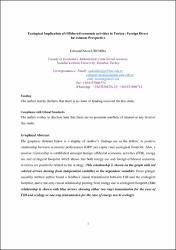| dc.contributor.author | Udemba, Edmund Ntom | |
| dc.date.accessioned | 2020-07-22T20:16:10Z | |
| dc.date.available | 2020-07-22T20:16:10Z | |
| dc.date.issued | 2020 | en_US |
| dc.identifier.issn | 1614-7499 | |
| dc.identifier.issn | 0944-1344 | |
| dc.identifier.uri | https://hdl.handle.net/11363/2324 | |
| dc.description | Document Information
Language: English
Accession Number: WOS:000545065300005
PubMed ID: 32617824 | en_US |
| dc.description.abstract | Turkish place in industrial activities is strategic, and its involvement in oil and gas importation because of high energy utilization in manufacturing sector is susceptible to high emission. For this, it is required that the economy be researched towards its involvement in both emission inducement and abatement globally. The author adopts ecological footprint and offshored economic activities as proxies to both environment and foreign direct investment (FDI) in ascertainment of Turkish involvement in global emission and decarbonization. Structural break analysis, autoregressive distributed lag-bound testing, and Granger causality were utilized for the effective analysis of the offshore implication of environmental performance in Turkey. The author's findings are as follows: a positive relationship between economic performance (GDP per capita) and ecological footprint, hence giving credence to growth-induced pollution. Also, a positive relationship is established among foreign offshored economic activities (FDI), energy use, and ecological footprint which shows that both energy use and foreign offshored economic activities are positively related to the ecology which established unfavorable impact on the environment. This supports the pollution haven hypothesis (PHH) which is among the theoretical backgrounds of this study. Among the findings established in this study is from Granger causality method which supports the pollution haven hypothesis. They are as follows: a feedback causal transmission between FDI and the ecological footprint, and a one-way causal relationship passing from energy use to ecological footprint. With these findings, it can be said that the environmental implication of foreign offshored economic activities in Turkey is unfavorable. Policy implication of Turkey should be towards moderation of economic growth and the activities of foreign investors for sustainable energy, environment, and growth. | en_US |
| dc.language.iso | eng | en_US |
| dc.publisher | SPRINGER HEIDELBERG, TIERGARTENSTRASSE 17, D-69121 HEIDELBERG, GERMANY | en_US |
| dc.relation.isversionof | 10.1007/s11356-020-09629-9 | en_US |
| dc.rights | info:eu-repo/semantics/openAccess | en_US |
| dc.rights | Attribution-NonCommercial-NoDerivs 3.0 United States | * |
| dc.rights.uri | http://creativecommons.org/licenses/by-nc-nd/3.0/us/ | * |
| dc.subject | Ecological footprint | en_US |
| dc.subject | Offshored economic activities | en_US |
| dc.subject | FDI | en_US |
| dc.subject | Energy use | en_US |
| dc.subject | GDP | en_US |
| dc.subject | ARDL | en_US |
| dc.subject | Turkey | en_US |
| dc.subject | ENVIRONMENTAL KUZNETS CURVE | en_US |
| dc.subject | POLLUTION HAVEN HYPOTHESIS | en_US |
| dc.subject | ENERGY-CONSUMPTION | en_US |
| dc.subject | CO2 EMISSIONS | en_US |
| dc.subject | NONRENEWABLE ENERGY | en_US |
| dc.subject | GROWTH | en_US |
| dc.subject | FOOTPRINT | en_US |
| dc.subject | QUALITY | en_US |
| dc.subject | AUTOREGRESSIVE TIME-SERIES | en_US |
| dc.title | Ecological implication of offshored economic activities in Turkey: foreign direct investment perspective | en_US |
| dc.type | article | en_US |
| dc.relation.ispartof | ENVIRONMENTAL SCIENCE AND POLLUTION RESEARCH | en_US |
| dc.department | İktisadi İdari ve Sosyal Bilimler Fakültesi | en_US |
| dc.relation.publicationcategory | Makale - Uluslararası Hakemli Dergi - Kurum Öğretim Elemanı | en_US |



















